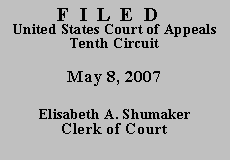 | Keyword |
Case |
Docket |
Date: Filed /
Added |
| Keyword |
Case |
Docket |
Date: Filed /
Added |
 (14380 bytes)
(14380 bytes)
 (8406 bytes)
(8406 bytes)
 UNITED
STATES COURT OF APPEALS
UNITED
STATES COURT OF APPEALS
TENTH CIRCUIT
ORDER DENYING CERTIFICATE OF
APPEALABILITY
Before LUCERO, HARTZ, and GORSUCH,
Circuit Judges.
Hoskie Walter, Sr., pleaded guilty in the United States District Court for
the District of New Mexico to one count of abusive sexual contact in Indian
Country. See 18 U.S.C. §§ 1153, 2244(a)(1). The district court
sentenced him to
97 months' imprisonment followed by three years' supervised release. His plea
agreement contained a waiver of his right to appeal, and he appealed neither his
conviction nor his sentence. Instead he filed a motion under 28 U.S.C. § 2255,
which, as far as we can discern, sought to vacate his term of supervised release
because it was not permitted by the statute of conviction, violated the
constitutional protection against double jeopardy, and violated what he calls the
"Severance Clause of the United States Constitution." Pet'r Mem. of Law in
Supp. of His § 2255 at 1, Walter v. United States, No. 06-404, (D.N.M.
July 3,
2006). The Magistrate Judge's Proposed Findings and Recommended
Disposition, which was adopted by the district court, recommended that the
motion be denied because (1) Mr. Walter had not raised these issues on direct
appeal, see United States v. Warner, 23 F.3d 287, 291 (10th Cir. 1994) (a
defendant cannot raise issues in a § 2255 motion that he has failed to present on
direct appeal), and (2) he could not escape the procedural bar because he had not
demonstrated good cause for his procedural default and had not suffered actual
prejudice since his contentions had no merit. The district court denied his
request for a certificate of appealability (COA) to appeal the district court's
denial of his motion, and he now applies to this court for a COA. See 28 U.S.C.
§ 2253(c)(1) (requiring COA). We deny a COA and dismiss the appeal.
A movant seeking a COA must make a "substantial showing of the denial
of a constitutional right." § 2253(c)(2). Such a demonstration "includes showing
that reasonable jurists could debate whether (or, for that matter, agree that) the
petition should have been resolved in a different manner or that the issues
presented were adequate to deserve encouragement to proceed further." Slack v.
McDaniel, 529 U.S. 473, 484 (2000) (internal quotation marks omitted).
Mr. Walter has not met this standard.
The magistrate judge's analysis of the merits of Mr. Walter's contentions
cannot reasonably be disputed. Addressing first Mr. Walter's contention that
there was no statutory authority for supervised release, we acknowledge that the
statute under which he was convicted does not mention supervised release. See
18 U.S.C. § 2244(a)(1). Another statute, however, 18 U.S.C. § 3583(a),
explicitly allows the court to "include as a part of the sentence a requirement that
the defendant be placed on a term of supervised release after imprisonment." See
also United States v. Robinson, 62 F.3d 1282, 1285 (10th Cir. 1995). As to
Mr. Walter's double-jeopardy argument, the supervised-release term was not a
multiple punishment but a congressionally authorized part of his original
sentence. See § 3583(a). Finally, no one other than Mr. Walter appears
to be
familiar with a "Severance Clause" in our Constitution. Some of his pleadings
suggest that he may be referring to separation-of-powers doctrine; but we fail to
see any threat to that doctrine in the imposition of a term of supervised release.
Because Mr. Walter's contentions clearly lack merit, we need not concern
ourselves with whether they are procedurally barred. We DENY a COA and
DISMISS the appeal.
ENTERED FOR THE COURT
Harris L Hartz
Circuit Judge
 | Keyword |
Case |
Docket |
Date: Filed /
Added |
| Keyword |
Case |
Docket |
Date: Filed /
Added |
 (14380 bytes)
(14380 bytes)
 (8406 bytes)
(8406 bytes)
Comments to: WebMaster,
ca10 [at] washburnlaw.edu.
Updated: May 9, 2007.
HTML markup © 2007, Washburn University School of Law.
URL: http://ca10.washburnlaw.edu/cases/2007/05/06-2318.htm.

